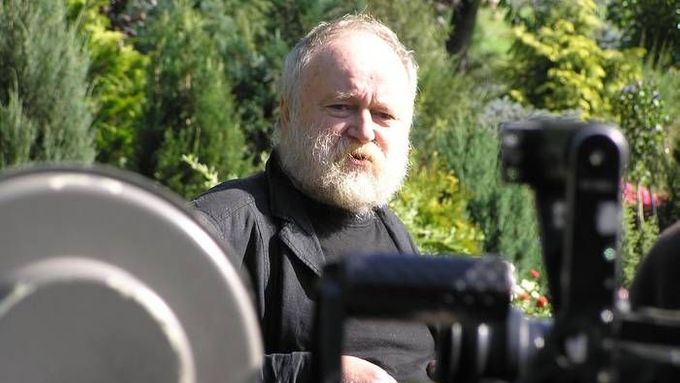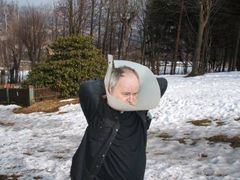Review - Karel Vachek, the legendary Czech film director and head of the documentary department at the Prague Film Academy FAMU, starts shooting his new documentary this year.
The film titled The Obscurant and His Kind will be released next year, portraying UFO witnesses, water finders, time machines, invisibility or other "ancient phenomena".
"We received a grant from the State Fund for films, even though it is lower than we expected. Now we have to gain the Czech public television's support as well, "says producer Radim Procházka who worked with Vachek on his last film Záviš, the King of Pornfolk.
The brand new film on supernatural appearances will be co-financed by the Poles and the French. The expected budget will be around seven million crowns.
The movie will line up behind a series of Vachek's extravagant and extra long series of films on many various topics, picturing the Czech Republic of 1990's and the new millennia.
Incomparable art
Vachek, loved by some and hated by others, makes films that do not fit with the majority's expectations about films. His work is compared often to film poetry.
"The same way that contemporary poets are outside of the interest range of the public, also Karel Vachek's film are quite unjustly left aside from the mainstream of the cinematography," Procházka says.
"The same way no one confuses Agatha Christie with George Orwell or Michael Viewegh with Miloš Urban, no one would confuse Jan Hřebejk with Karel Vachek," producer Procházka compares "his" director with one of the most successful Czech mainstream directors.
Procházka also says that no one really knows exactly what the film will be about because Vachek relies on inspiration of the moment so "I do not even put together a pre-production plan because I would throw it away very quickly anyway," Procházka explains.
The longer, the better
All Vachek's older movies will be released on a DVD this year, his tetralogy The Small Capitalist will be available in May.
Vachek's movies are not only very long themselves, also their names break the records. The series includes the movies New Hyperion, or Equality, Liberty, Brotherhood (1992), What is To Be Done? (A Journey from Prague to Český Krumlov or How I Formed a New Government) (1996), Bohemia Docta, or The Labyrinth of the World and the Lust-house of the Heart (a Divine Comedy) (2000) and Who will Watch the Watchman? Dalibor Or The Key to Uncle Tom's Cabin (2003). Bohemia Docta is the longest film ever made in the Czech lands.
The four movies close the series in which also Vachek's older and well-known films Moravian Hellas (1963) and Elective Affinities (1968) were published.
All films that break the records with their length will be shown in the old-school movie theater Ponrepo in Prague. DVDs include English, Polish and French subtitles with makes their international distribution more feasible.
Political image watching miles away
Karel Vachek's most famous movie Elective Affinities for which he also won the Golden Camera at the Berlinale Film Festival was filmed in 1968.
It covers a turbulent week between March 14 and March 30 1968 when president Antonín Novotný stepped down and Ludvík Svoboda became the new Czechoslovakian president.
Vachek and his camera were back then present at most of the happenings, following the main actors of 1968 scene - both presidents as well as for example Alexander Dubček.
All of them are shown in informal situation talking to each other, putting a mosaic of that time that culminated a half year later when the Soviet Army occupied Czechoslovakia. "Many dialogues show that the politicians back then did not know yet that well what a film camera can do. Looking up for your own political image was still worlds away," publishers of the DVD say.
Prague Spring and a Czech Dream
Karel Vachek was born in 1940 and studied at the Prague Film Academy under Elmar Klos, a film director that won the international Oscar for his film The Shop on the Main Street. After making his portrait of the Prague Spring in 1968, Karel Vachek was not allowed to work.
He emigrated with his family to the US via France in 1979 but came back due to his wife's bad health. Since 1994 he has been teaching at FAMU, several younger film directors were influenced by him, among others Filip Remunda and Vít Klusák, the authors of the film Czech Dream, released in 2004, portraying happenings around one fake campaign and one opening of a fake supermarket.


